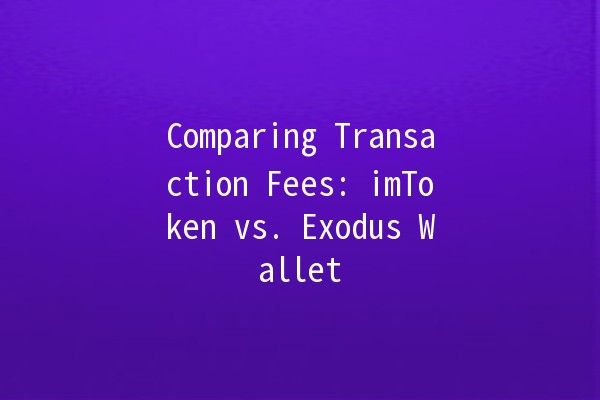When it comes to managing cryptocurrencies, choosing the right wallet is crucial for both security and costeffectiveness. Two popular options in the cryptocurrency community are imToken and Exodus. This article delves into a comprehensive comparison of the transaction fees associated with both wallets, helping you make an informed choice.
imToken is a leading digital wallet that supports multiple cryptocurrencies. It is particularly wellknown for its userfriendly interface and secure storage solutions. imToken allows users to manage Ethereum and ERC20 tokens efficiently, providing seamless trading and exchanging functionalities.

Exodus, on the other hand, is renowned for its visually appealing and intuitive design. It supports a wide range of cryptocurrencies and offers builtin exchange functions, making it a favorite among those who prioritize usability alongside functionality.
Understanding the structure of transaction fees for imToken and Exodus is essential for users who engage in frequent trading. Both wallets charge fees, which can significantly affect your overall transaction costs.
imToken’s transaction fees are primarily network fees associated with the Ethereum blockchain. These fees fluctuate based on network congestion and the gas price at the time of the transaction. Users have the flexibility to choose their gas fees, allowing for faster transactions when necessary.
Typical Fees: For a standard Ethereum transaction, fees could range from $0.50 to several dollars, depending on the gas price set by the user and the current network conditions.
Fee Customization: imToken users can select between different transaction speeds, each with corresponding fees, offering a balance between immediate transaction confirmation and costsaving.
Exodus charges a combination of fees that include network fees and exchange fees when users trade cryptocurrencies within the wallet. Like imToken, network fees depend on the specific blockchain used and its traffic at the moment.
Typical Fees: Exodus tends to have slightly different fee structures for various cryptocurrencies. For example, Bitcoin transactions might cost a few dollars, while Litecoin transactions may be cheaper, typically around $0.50 to $
Managing your transaction costs effectively can greatly enhance your overall productivity when using digital wallets. Here are five strategies to help you optimize your usage of imToken and Exodus, specifically regarding transaction fees:
Explanation: Keep an eye on Ethereum and Bitcoin network conditions through various blockchain explorers. By planning your transactions during offpeak hours, you can save significantly on gas fees.
Application Example: If you note that gas prices are expected to peak later in the day, schedule your transactions for early morning when fees are typically lower.
Explanation: imToken allows users to customize their gas fees, letting you select a faster confirmation speed at a higher cost or a slower one at a lower cost.
Application Example: If you don’t require immediate confirmation for a transaction, choose a slower speed with a reduced gas fee, potentially saving up to 50% on costs.
Explanation: Exodus provides options to see estimates of fees before confirming a transaction, enabling users to make more informed decisions.
Application Example: Before executing an exchange between Bitcoin and Ethereum, evaluate the fees and consider whether to wait for a drop in transaction costs.
Explanation: Larger transactions can incur higher fees due to their size and complexity. Keeping transactions smaller can help minimize costs.
Application Example: If you are transferring $100 worth of Ethereum, consider breaking it down into smaller transfers of $25 to save on fees, especially during times of high gas prices.
Explanation: Both imToken and Exodus may update their fee structures and policies. Regularly reviewing these terms can help you stay informed.
Application Example: Set a monthly reminder to check the official websites or app notifications for any changes in their fee structures that might impact your trading strategies.
Both wallets have different fee structures, with imToken primarily using network fees based on gas prices for Ethereum and ERC20 tokens. In contrast, Exodus combines network fees with additional exchange fees for currency conversion within the wallet.
Yes, both wallets offer various options to potentially reduce transaction fees, such as customizing gas prices on imToken or timing trades on Exodus based on network congestion.
Both wallets are transparent about their fees. However, users should always doublecheck the total costs displayed before completing transactions to avoid unexpected charges.
Gas fees directly influence the speed and cost of your transaction on imToken. Setting a higher gas fee can lead to quicker confirmations, while a lower fee may delay the transaction.
Both wallets are considered secure options for cryptocurrency storage. However, it is recommended to use additional security measures, such as enabling twofactor authentication and keeping your recovery phrases safe.
For newcomers, Exodus may be a more userfriendly option due to its intuitive design. However, imToken's focus on Ethereum and ERC20 tokens could be preferable for users heavily invested in the Ethereum ecosystem.
Choosing between imToken and Exodus largely depends on your individual needs regarding user experience and transaction cost management. Both wallets provide robust solutions for cryptocurrency management, but understanding their fee structures can significantly affect your trading strategies. By employing the tips outlined above, users can effectively navigate the often unpredictable world of cryptocurrency transaction fees, ensuring they maximize value from their investments.